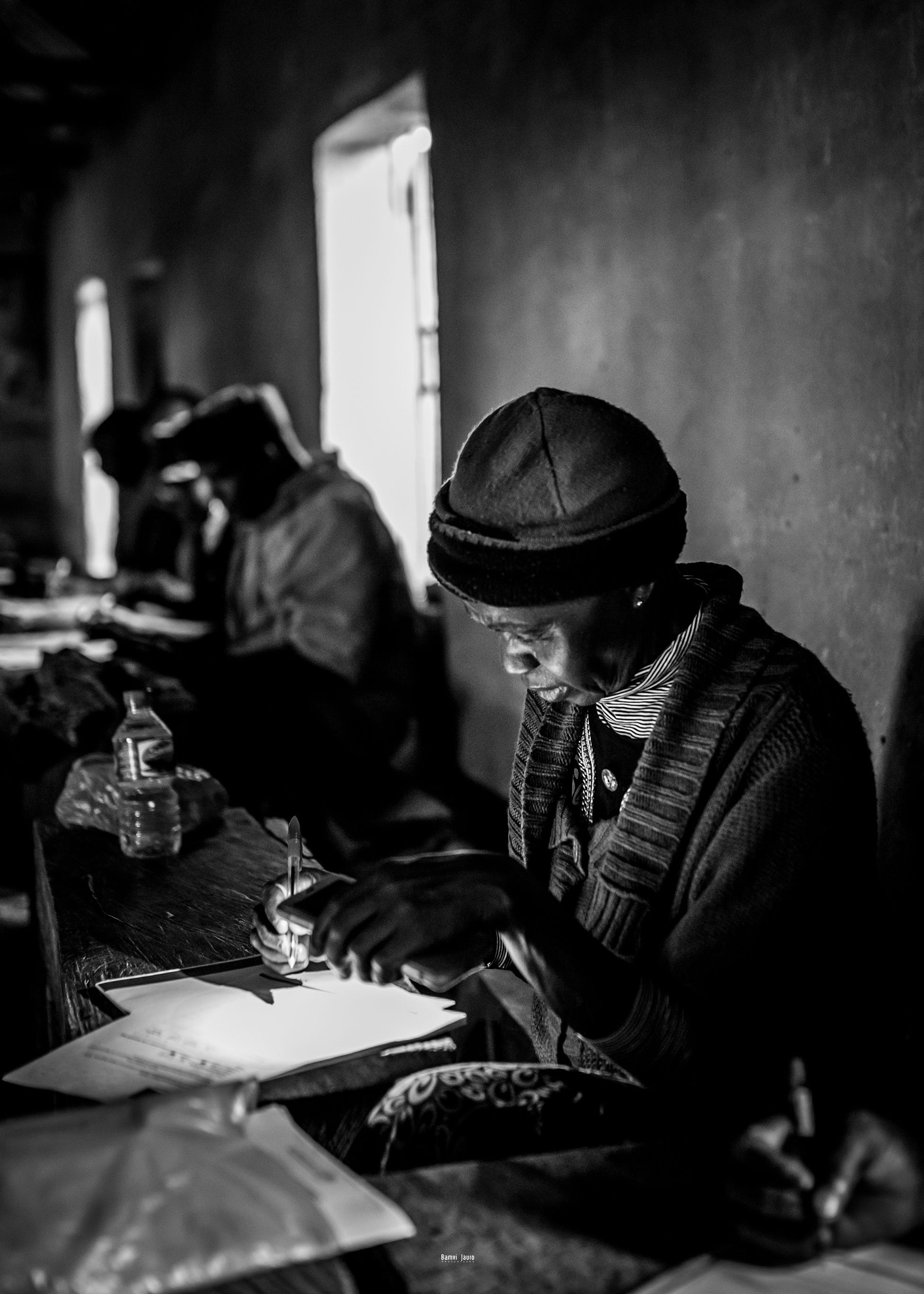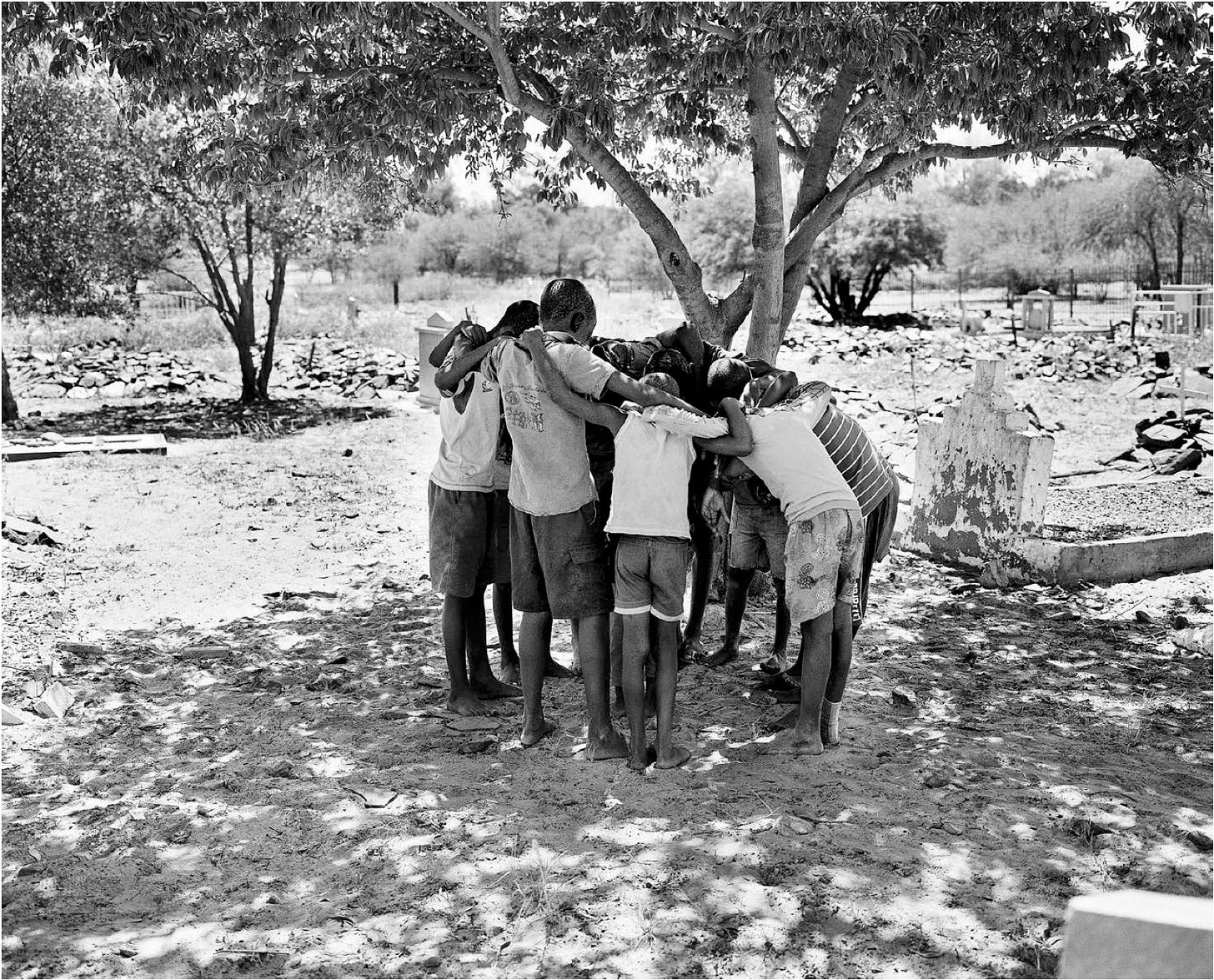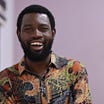Covered in a woolen sweater and headgear, the shadowy face of an aged woman, sitting at a wooden desk is lit from light bouncing off sheaves of paper resting on a booklet. She’s writing, and on the desk is a bottle of water and a snack. The light shines from a phone screen firmly held in one creased hand while the other grasps a pen. Her entire frame is trained on the task before her. In fairly apparent symmetry, spectral figures of other writers relying on blurry light from open windows can be seen on both sides of her. But for stains and scratches, the wall behind the woman is blank, much like the paper in front of her.
— Onotu David
“The genuine and unposed moments of a subject is a call to me.”
This photograph was taken in a village in Pankshin, Plateau state, Nigeria. I was opportune to be part of a team facilitating an agricultural capacity building workshop in that village. There is no electricity in the classroom we used and the participants needed to fill in their response letters. Everyone needed a source of light for that purpose no matter how small. I suddenly saw this woman using the light from her phone, while others who don't have phones, or whose phone batteries were out of power resorted to other means, like the ray of light streaming in from the windows.
I have a candid approach to photography. I am more interested in organic settings and the spontaneity of the given moment. The genuine and unposed moments of a subject is a call to me. I capture my photos usually without the knowledge of the subject but in a manner that does not jolt the subject out of the moment. Choosing the perfect moment grows with practice, and one can never really tell what action might follow or at what angle the lens might see differently. I see photography as the mirror through which the human soul can be revealed, and deep shadows as shapers of stories and conversations. Good photographs have a great impact on people's emotions. Photographs have the ability to offer solutions and stir up change for human good.
— Bamvi Jauro
About Bamvi Jauro
Bamvi Jauro is an African photographer. He was born and currently lives in Nigeria, where he offers photography lessons to budding photographers. Having worked for numerous firms and individuals, he is currently a creative partner for the Custodians of African Literature (COAL) and Nhub, an ICT firm committed to telling digital stories of young African techpreneurs. Bamvi is currently on a tour of Plateau State in north central Nigeria on a photo project which, he hopes, will bring the required awareness on water scarcity issues amongst rural and mountainous communities. See more of his work on Instagram.
LAST WEEK — “The Borderlands” by Jo Ractliffe
But in Riemvasmaak, Pomfret, Schmidtsdrift, and Platfontein, I was forced to confront my resistance because to avoid photographing people would mean to evacuate them from their homes and their land once again. In these places, people are re-establishing communities that have been broken for decades, making new lives and forging new identities for themselves. I needed to acknowledge that.
This is the 101st edition of this publication, which also read on web (best for viewing images), and via the Substack iOS/Android apps.
TENDER PHOTO is a newsletter on African photography. Every Wednesday we feature a photograph and a short caption about it, and include a statement from the photographer. Every Friday, we publish commentaries or photo-essays in response to photographs previously featured on the newsletter. The most recent series is INDEX. Please note that there would be no Friday edition until January 26.
Our goal is to work with African photographers by creating a platform in which they lead the cataloguing and engagement with their work.
Thank you for reading. If this newsletter was shared with you, consider subscribing, or forward to a friend. Please whitelist the newsletter to ensure you never miss it.







This is a beautiful pic, Onotu. We can see the different challenges that she overcomes ingeniously. Thanks for sharing!